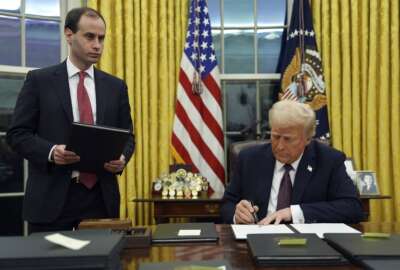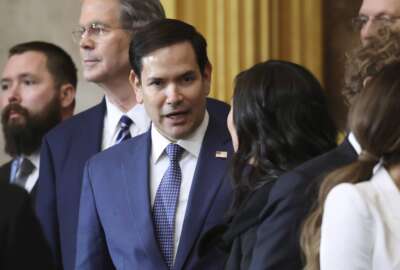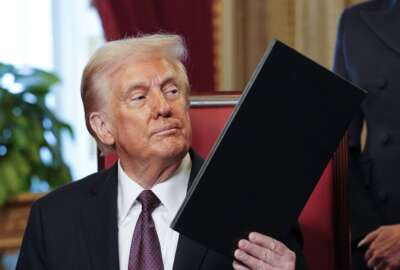Reaching a Pentagon budget deal: From wishful thinking to reality
Two former DoD comptrollers say a two-year defense budget deal could achieve President Barack Obama's goal of eliminating sequestration.
wfedstaff | April 18, 2015 1:49 am
By Jory Heckman
Federal News Radio
President Barack Obama’s sequester-busting budget plan may be just wishful thinking until it passes through Congress, but on the defense side, two former DoD comptrollers say there’s promise that a two-year spending deal could be a reality in the months to come.
Bob Hale, former Defense Department comptroller, now serving as an adviser to contractor Booz Allen Hamilton, told In Depth with Francis Rose there’s a slim chance that Congress won’t remove the Pentagon’s $500 billion spending cap, but he said the more likely outcome would be that the House and Senate will deliver on a deal that will eliminate sequestration. 
Both Hale and former Defense Department Comptroller Dov Zakheim, currently a senior adviser at the Center for Strategic and International Studies, expressed cautious optimism about a deal being reached after hearing a recent speech by House Armed Services Committee member Rep. Rob Wittman (R-Va.).
“I do think there is a good chance that through the budgeting process that sequestration will be set aside,” Wittman said at the American Federation of Government Employees annual legislative conference in Washington.
Wittman chairs the HASC subcommitee that oversees readiness and civilian employees.
Up until this point, sequestration has been a tricky situation to avoid. While Congress passed legislation in 2013 to lift spending caps on total domestic and defense spending until the end of fiscal 2015, those cuts will return in fiscal 2016 if Congress does nothing.
Zakheim said it’s a good sign to hear a House Republican signal the need to get rid of sequestration, but he remains skeptical until a definite plan is in the works.
“If you’re hearing someone in the House side say that, where you have a lot of budget hawks — those are the people who simply do not want to go above the caps — then that’s important,” Zakheim said. “Clearly, the members of the House Armed Services Committee in general would just like to raise defense spending and are much less concerned about the other side of the equation. It’s going to be extremely difficult, if not impossible, to get anything on entitlement reform. So you’re really talking about what you do on the non-defense discretionary spending side versus the defense discretionary spending side.” 
“We’ll be getting to the debt ceiling at that point, they’ll need to resolve the issue, they’ll need to do some kind of appropriation. So it’s going to be a number of months,” Hale said.
Technically speaking, the debt ceiling will be reached on March 15, but spring tax revenue from the IRS will buy the government additional time before Congress needs to act.
Hale said a two-year deal would probably look a lot like the December 2013 agreement struck between Rep. Paul Ryan (R- Wis.) and Sen. Patty Murray (D-Wash.) amid the threat of a government shutdown.
“You don’t have to extend the Medicare age or raise the capital gains tax to get some revenues if you’re talking about — by the standards of the federal government — relatively small amounts, another $10 billion or $15 billion for defense, maybe even a little on the non-defense side,” Hale said. So I don’t know where this deal will go, but it will probably have to be offset in some way.”
RELATED STORIES:
Pentagon docs: Obama to request big Pentagon budget hike
Five things every federal employee should know about the Obama budget
Copyright © 2025 Federal News Network. All rights reserved. This website is not intended for users located within the European Economic Area.





